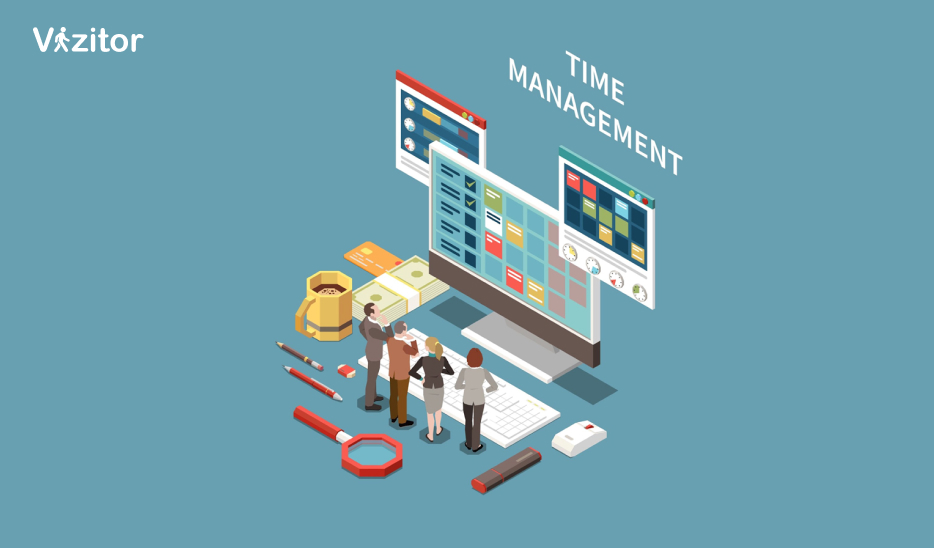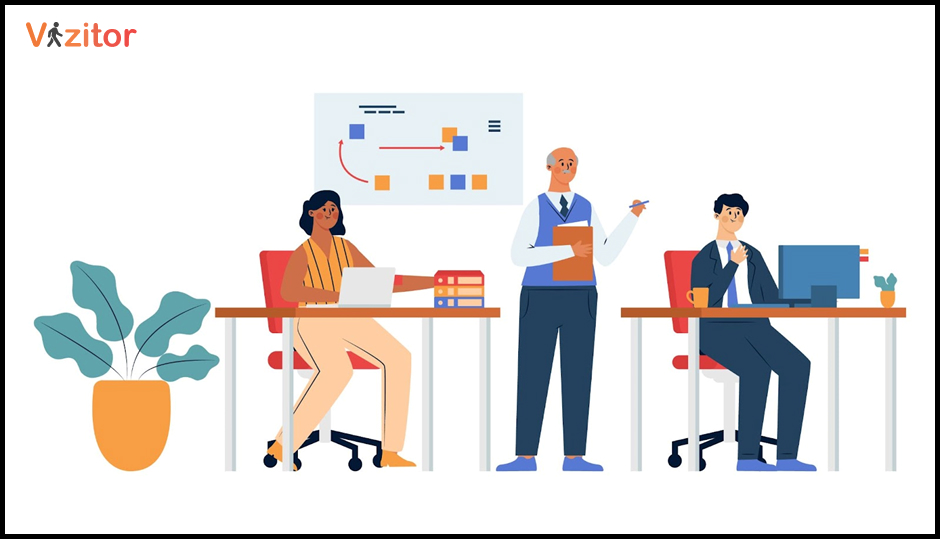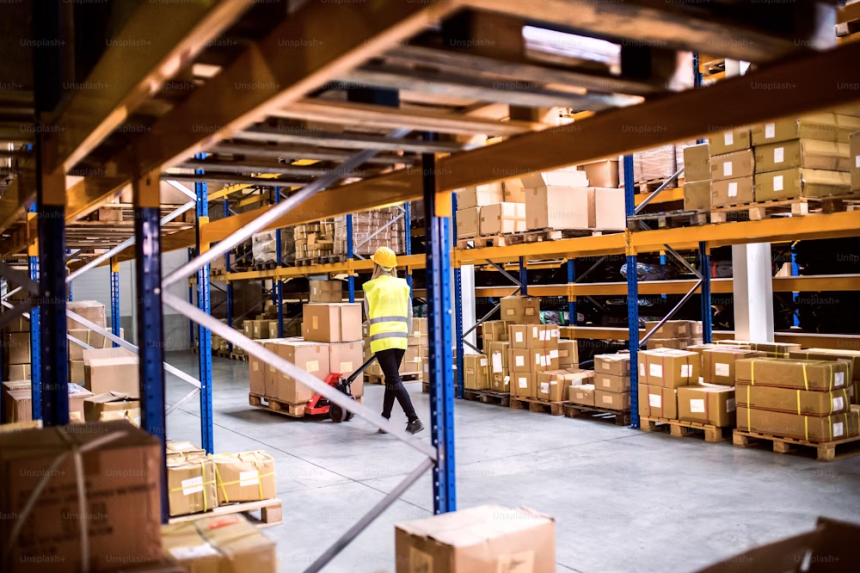Table of Content
Try Vizitor for Free!

Fri, Dec 15, 2023
Read in 5 minutes
Workplace productivity is a key concern for many organizations, yet it is often attributed to the wrong causes. One overlooked factor is the lack of effective workplace management. A well-organized and structured workplace is essential for fostering a healthy and productive environment.
Employees thrive in spaces that are efficiently managed, maintained, and equipped. However, achieving this requires more than effort—it demands modern solutions. Investing in digitalized workplace management tools like room booking systems can transform office operations and address common challenges such as managing desk bookings, equipment, and parking spaces.
In this blog, we will discuss the significance of workplace efficiency and explore how room booking systems can enhance it. Let’s dive into:
- What is Workplace Efficiency?
- Why is Workplace Efficiency Crucial for Offices?
- Five Simple Strategies to Increase Workplace Efficiency
What is Workplace Efficiency?
Workplace efficiency refers to how effectively an organization or team uses its resources—time, labor, technology, and space—to maximize output while minimizing waste. It involves:
- Streamlining workflows
- Reducing redundancies
- Achieving objectives productively and sustainably
A workplace becomes efficient when it can deliver high-quality results, adapt to changes, and meet its goals consistently with minimal effort.
Why is workplace efficiency important for offices?
Workplace efficiency is crucial for offices as it directly impacts productivity and sustainability. An efficient workplace ensures that tasks are completed while maximizing output. It also helps in minimizing unnecessary costs and resources. This enhances the organization’s ability to meet deadlines and contributes to cost-effectiveness.
Efficient offices foster a positive working environment by reducing frustration associated with inefficient processes.
Workplace efficiency promotes employee satisfaction and engagement. Sometimes, individuals can see the tangible results of their efforts and feel a sense of accomplishment. For businesses, improved customer satisfaction and swift adaptation are considered remarkable.
Moreover, an efficient workplace encourages innovation and positioning the organization for long-term success.
Why is Workplace Efficiency Crucial for Offices?
1. Enhances Productivity
Efficient offices ensure tasks are completed faster and with fewer errors, enabling employees to focus on strategic activities.
2. Reduces Costs
Streamlined processes minimize resource wastage and reduce unnecessary operational costs.
3. Boosts Employee Satisfaction
When employees see tangible results and work in a well-organized environment, they experience greater engagement and motivation.
4. Improves Customer Experience
Efficient operations result in timely deliveries and higher customer satisfaction, ultimately enhancing the company’s reputation.
5. Encourages Innovation
With resources optimized, teams can focus on creativity and problem-solving, positioning the organization for long-term success.
5 Simple Strategies to Increase Workplace Efficiency
1. Streamline Processes and Workflows
Start by analyzing existing workflows to identify bottlenecks and inefficiencies. Simplify or eliminate redundant tasks to save time.
- Standardize procedures to ensure consistency.
- Use automated tools for repetitive tasks.
- Implement efficient communication channels to reduce delays.
By streamlining workflows, employees can focus on core tasks, improving productivity and reducing frustration.
2. Utilize Technology Wisely
Technology plays a pivotal role in optimizing workplace operations. Incorporating room booking systems can help with resource allocation and eliminate common inefficiencies.
Examples of Technology Solutions:
- Hot Desk Booking Software: Assigns desks efficiently in a flexible work environment.
- Equipment Booking Software: Ensures availability and proper usage of office equipment.
- Vehicle Booking Software: Simplifies transport scheduling.
- Parking Management Software: Eases parking allocation for employees and visitors.
Training employees to use these tools effectively ensures maximum benefits, helping teams work smarter, not harder.
3. Establish Effective Communication Practices
Clear communication is essential for workplace efficiency. Miscommunications can lead to delays, errors, and frustration.
- Implement communication tools like Slack, Microsoft Teams, or workplace management platforms to facilitate seamless interactions.
- Encourage open communication where employees feel comfortable sharing feedback and updates.
- Conduct regular team meetings to align goals and expectations.
When communication flows smoothly, collaboration improves, and teams work more cohesively.
4. Prioritize and Delegate Tasks
Efficiency often comes down to proper prioritization and delegation.
- Define clear objectives and establish deadlines to focus on high-priority tasks.
- Assign responsibilities based on individual strengths and expertise.
- Foster a culture of accountability to ensure employees take ownership of their tasks.
Delegation frees up managerial time for strategic planning and empowers employees to contribute more effectively.
5. Promote a Healthy Work Environment
A positive and well-maintained workspace enhances focus, creativity, and overall productivity.
- Keep the office clean, organized, and equipped with ergonomic furniture.
- Provide spaces for relaxation and encourage regular breaks to prevent burnout.
- Promote a culture that values work-life balance and prioritizes employee well-being.
A healthy workplace environment nurtures motivation and engagement, making it easier for employees to contribute effectively.
The Role of Room Booking Systems in Workplace Efficiency
Among the various strategies, room booking systems stand out as a critical tool for boosting efficiency. They help organizations manage resources seamlessly, eliminate scheduling conflicts, and enhance overall productivity.
Key Benefits of Room Booking Systems:
- Simplifies the process of reserving meeting rooms, desks, or equipment.
- Reduces wait times and prevents double bookings.
- Provides real-time availability, enabling faster decision-making.
- Tracks usage patterns, helping admins optimize resource allocation.
Vizitor: Your Partner in Efficiency
Vizitor provides innovative technology solutions to improve workplace efficiency. Our offerings include:
- Room Booking Systems
- Meeting Room Booking Software
- Visitor Management Systems
Why Choose Vizitor?
- Seamless integration with your existing systems.
- User-friendly interfaces for easy adoption.
- Scalable solutions tailored to your business needs.
We believe in delivering quality solutions to help your organization thrive.
Conclusion
Workplace efficiency is the backbone of productivity, employee satisfaction, and organizational success. By implementing strategies like streamlining workflows, leveraging technology, improving communication, prioritizing tasks, and fostering a healthy work environment, organizations can create a high-performing workspace.
Among these strategies, room booking systems play a transformative role in resource optimization and reducing inefficiencies.
Ready to upgrade your workplace efficiency? Schedule a demo with Vizitor today and take the first step towards a smarter, more productive office!









